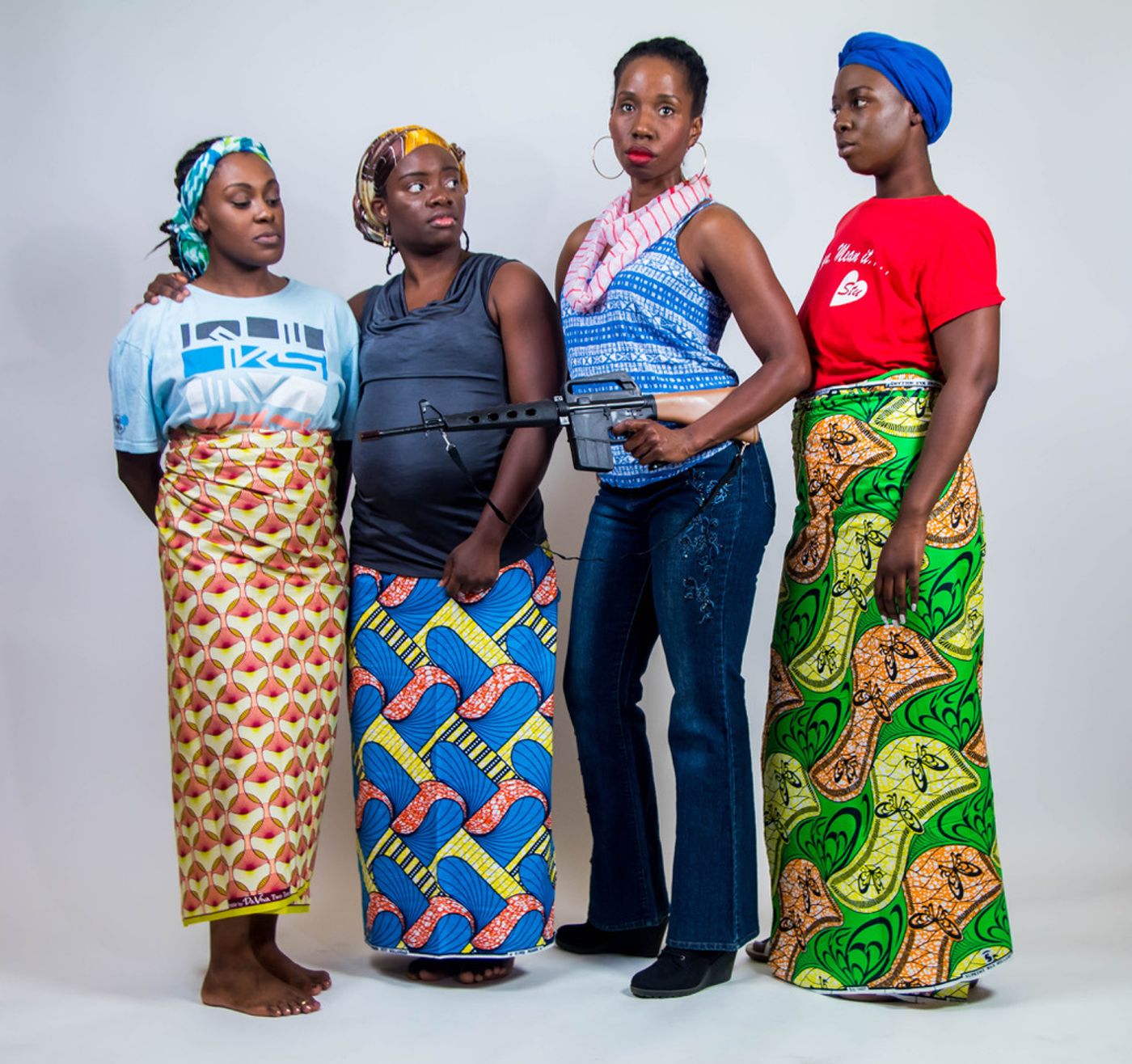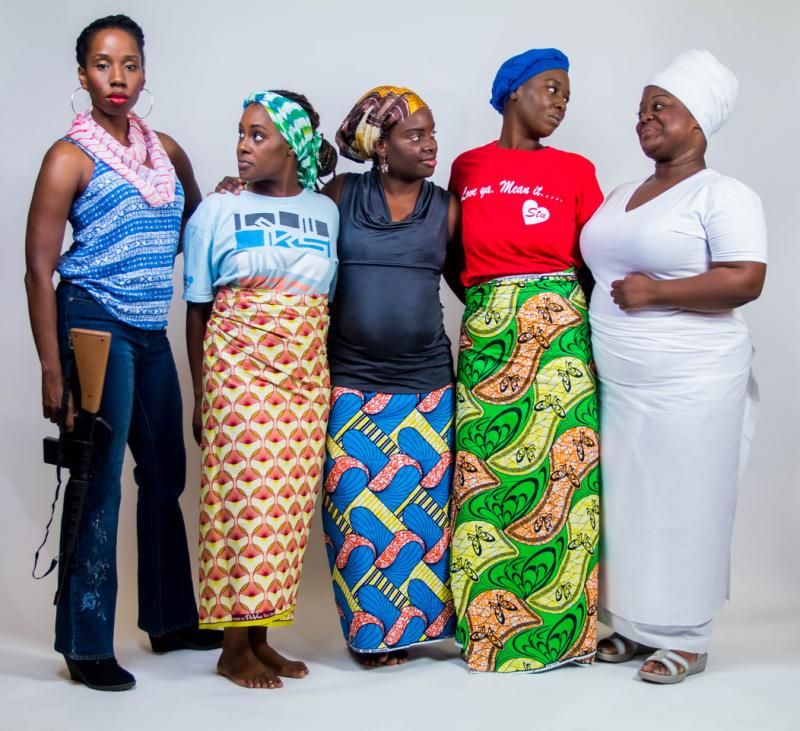Review: Panther Star Shows Us a Grittier Africa in ECLIPSE

Locked into an action hero role as Okoye in the phenomenally successful Black Panther movie, Danai Gurira can expect to achieve enduring renown as the most compelling and commanding woman in Marvel's hottest franchise. But Gurira may have the talent and determination to leave deeper marks as a stage actress and a playwright. Before Black Panther, when Gurira was best known for her recurring role as Michonne in AMC's The Walking Dead series, one of her plays made it to Broadway in 2016, seven years after her Broadway acting debut in August Wilson's Joe Turner Has Come and Gone.
ECLIPSED certainly didn't come and go quietly, scooping up four Tony nominations, including one for Gurira's script and another for her Panther cohort, Lupita Nyong'o, in the leading role. Working on Eclipsed was probably more challenging than wielding Okoye's spear and filming her exploits. Gurira not only traveled to Liberia to recapture the history of the country's civil wars, she interviewed over 30 women who had survived them.
There isn't anything in this patch of war-torn Liberia as glamorous or high-tech as General Okoye's homeland of Wakanda, but the set design by producer Rory Sheriff, director Dee Abdullah, and Omar Donnelly is a treasurable aspect of the Brand New Sheriff production currently at Spirit Square. Three wives of an unseen Commanding Officer in the rebel army appear to be sharing a crumbling one-room shack where the single appliance, a bedraggled portable radio, gets only intermittent reception.
When the CO issues his summons from offstage, Wife Number One and Wife Number Three line up dutifully in order of seniority at the threshold of their hovel, awaiting fresh commands for sex or food. He's a pretty lusty guy during the scenes we'll sample, during which time Wife Number Three goes through the full term of her pregnancy, not at all spurned from the CO's bed.
Wife Number Two has left the household, taking up arms to join the rebels seeking to overthrow President Charles Taylor - and because shouldering an AK-47 is great way to fend off further unwanted advances. Outwardly the toughest of the wives, Maima returns from the battlefield with gifts for the kidnapped captives she has left behind, so there is softness beneath her façade. Wife Number One, who demands obedience, isn't at all reconciled to Two's desertion and openly spurns her, a pretty tough cookie herself. This results in Number Three muting her enthusiasm for Two's beneficence, but it's still obvious that she is a sponge for affection, even the brutal brand meted out by the CO.
So the reason that Two will keep coming back is "The Girl," whom One and Three hide for as long as possible before the CO inevitably discovers her and makes her Wife Number Four - at the rear of the ritual lineup but not the CO's third choice for unsolicited sex. The sooner Two can huddle with The Girl, while the distaste for her repeated rapes is still raw, the more likely she is to be able to convince the shell-shocked ingenue to join her in soldiering.
Focus remains on the unsavory alternatives facing the wives, but these are women's stories told by a woman, so we don't see the battle over The Girl's future as a tug of war. Abdullah concentrates on the women as much as their conflicts, working long and fruitfully on getting authentic Liberian accents from them all, and binding them together as a cohesive ensemble.
That directorial approach had a couple of pitfalls at the performance I attended last Friday. When those authentic accents sped up, the women's sentences could become impenetrable thickets. The camaraderie they had established resulted in instances when the younger performers forgot they should be speaking to us as well as each other.

Of course, my frustrations about hearing chunks of the dialogue were only exacerbated by how interesting, individual, intense, and real Gurira's women are. Maima, Number Two, is labelled a devil by Number One, and when you watch Tracie Frank as Maima schooling The Girl on using her weapon in the heat of battle, you might concede that One has a point. Maima is modeled after Blood Diamond, a Liberian Civil War warrior written up and photographed in the New York Times - and the inspiration for Gurira's play. You do wonder, after seeing Frank onstage, how that sort of woman, conditioned in that extreme survivalist mode, goes on to live in peacetime.
Sullen, resentful, yet curiously regimented, Toni Oliver keeps us guessing about One for a while - or thinking that we fully know her. But The Girl's arrival awakens something inside her. At first, the spark is channeled into an urge to learn how to read. Fanned higher by Rita, a peacemaker who wanders onto the scene, that spark flares into a willingness to acknowledge her true name, Helena, and to explore her own identity. You won't really know her - and what Oliver is capable of - until her volcanic blow-up deep in Act 2, looking back on her recent past and contemplating her future.
Initially, Racquel Nathiri struck me as younger than Gbale Allen, so I wondered why Abdullah hadn't chosen Nathiri rather than Allen as The Girl. Gradually, I saw Abdullah's wisdom, for despite Three's impending motherhood, she remains the most childish woman we see as Nathiri makes her a stubborn study of self-indulgence, pettiness, and dependency.
Allen excels from the beginning as the traumatized captive who gets hidden away in a laundry basket, evolving from that humiliation to become a strong yet vulnerable personification of her people's uncertain choices in an uncertain future. Quiet as Allen first seemed, I never got the idea that The Girl was being pulled in One Direction or the other. She was merely content to have her elders think they were steering her until a moment of truth forced her to take a stand. Allen's eruption, arguably the Act 2 highlight, parallels Oliver's, with a harrowing backstory baked into it.
Only a flicker of such bitterness ruffles Rita's serenity as Ruby Edwards wafts into the wives' lives like an apparition, dressed all in white from turban to sandals. Gurira gives Rita a personal mission and tragedy to add urgency to her peacemaking travels. Yet as she sweetly penetrates to the heart of all three wives, Edwards hardly treads this earth, a businesswoman from the city who must appear to these degraded sex slaves like an impossible dream. She is the light. Or to put it in terms of Gurira's concept - and Abdullah's - Rita is what women can become when the eclipse of bloody, dehumanizing civil war is over.
Reader Reviews
Videos

